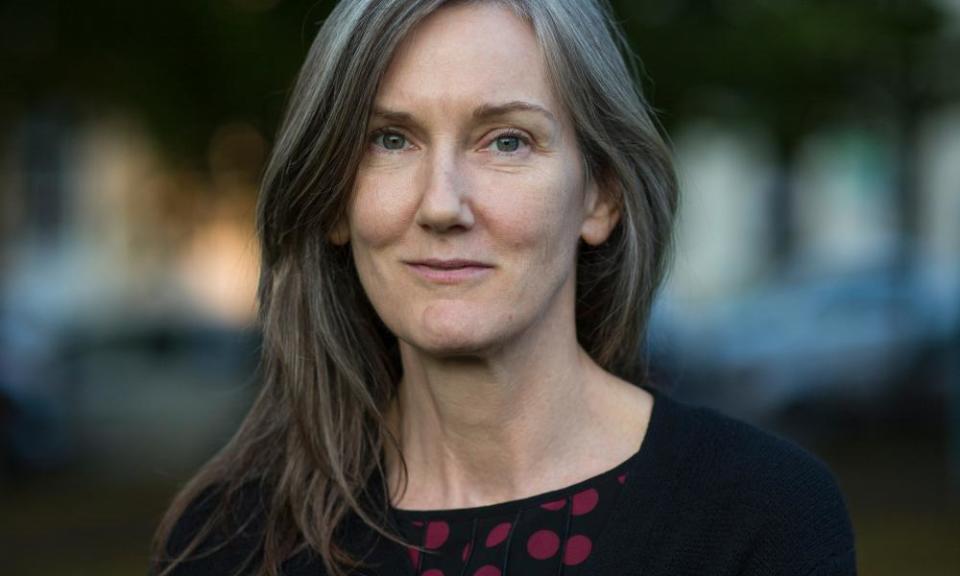Doxology by Nell Zink review – punk rock and devotion

“Doxology” is the name given to a short hymn of praise in the Christian liturgy. Nothing to do with doxxing – putting people’s private information on the internet – though the implicit pun ghosts through Nell Zink’s new novel all the same. The title is a bit of a challenge, then: it asks the reader, why is a long book mostly set between Washington DC and Manhattan between the late 80s and the present day, and mostly about families and punk rock music and environmental politics, called after a semi-obscure bit of devotional jargon?
The term itself appears in the text only once that I noticed, on the second page, when – the story moves pretty fast – the protagonist’s mother is being buried. That protagonist is Joe Harris, who has a rare developmental disorder. “Unknown to all, and for as long as he lived, Joe Harris was a case of high-functioning Williams syndrome,” Zink writes. Joe’s condition manifests itself in a sort of Forrest Gump-like ingenuousness. He makes friends with strangers, believes everything everyone tells him, and operates in the world without self-consciousness or calculation. He sees his mother off with “Bye-bye, Mommy!”, and hearing “Father, Son and Holy Ghost” at the funeral, “lifted his voice meaningfully”.
Joe has always sung eccentric songs of his own devising, and his story takes an unexpected left turn in young adulthood when – having befriended a punk called Pamela and her boyfriend Daniel in New York and formed a lo-fi three-piece – he suddenly zooms to rockstardom. With it come groupies, welcomed with characteristic wide-eyed enthusiasm, and drugs – likewise; and then, just when we think this is a book about Joe, the novel takes another direction.
Doxology is, in some ways, an old-fashioned thing – and all the better for it. It’s a big, loping, digressive multi-generational novel, telling several stories, of the sort you don’t see all that much in literary fiction these days. Point of view scoots merrily from character to character, major or minor, as suits the narration. And Zink blithely ignores that silliest cliche of literary advice: show, don’t tell. She’s a teller, the book is full of information, and her pert authorial commentary is part of the fun. When we’re introduced to a character, for instance, we might get a biographical precis: “Pamela Bailey was born the year after Joe, in 1969. She grew up an only child in northwestern Washington DC, between the national zoo and the National Cathedral. Her mother, Ginger, was a homemaker, active in the church – that is, the cathedral – and the friends of the local branch library.”
But why, you might wonder, does it start where it starts – rather, than, say, a generation further back – or end where it ends? That takes you back to the title, and to the quiet but insistent tendency to set scenes in cathedrals as much as in punk clubs. Even if there’s nothing so schematic as a religious framework visible in the book, it’s a story that is above all interested in the condition of innocence, and the way it survives, or doesn’t, under the pressure of history and of day-to-day life.
Joe may leave the story relatively unexpectedly, but the example of his (contested) martyrdom runs throughout. The principal protagonist of the second half is Pam’s daughter Flora. She was babysat in infancy by Joe, and has inherited a version of his innocence: “She began with wounded thoughts about dishonesty. Her faith in truthfulness was deeply ingrained, in part because of her school’s honor code, but mostly because of Joe. Her honesty started with him, and his honesty had never ended for her.”
Flora wants to change the world but, like most of us, doesn’t really have a clue how to go about doing so: “Her life was a continual struggle to distinguish career goals from the other kind. A career goal should be personal and practicable. Its variables should fall within realistic limits. Its success should depend as much as possible on factors under the individual’s control. Her career goal was to hold global warming to under two degrees Celsius. The appropriate college major for that would have been World Domination.” She ends up specialising in soil chemistry, which doesn’t get her far, then volunteering for the Green party – ditto.
Related: Nell Zink: ‘Politicians are going to lie to Greta Thunberg'
The straight-edge idealism of late 80s hardcore bands (Pamela worships Ian MacKaye and Minor Threat, and there’s a lovingly full evocation of the lower Manhattan hardcore scene, Sonic Youth rarities and all) resonates backwards with the hippie/boomer idealism of Pamela’s parents, and forwards to the millennial idealism of Flora’s generation. And meanwhile the twin towers fall, Trump is elected, and the planet burns.
This is no jeremiad, though. Sentence by sentence it is wry and very funny, generous in spirit and full of the quick of life. Its irony is warm. Like Joe, it sings - as Gerard Manley Hopkins would have it - in praise of everything fickle, freckled, swift, slow, sweet, sour, adazzle, dim. It’s a doxology, after all.
• Doxology is published by 4th Estate (£14.99). To order a copy go to guardianbookshop.com or call 0330 333 6846. Free UK p&p over £15, online orders only. Phone orders min p&p of £1.99.

